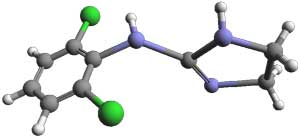Clonidine Is….

Clonidine’s ability to tone down sympathetic nervous system and ramp up parasympathetic nervous system functioning suggests it could be helpful in chronic fatigue syndrome
A ‘sympatholytic’ (sympathetic nervous system suppressing) drug, Clonidine works by activating alpha 2 adrenergic receptors in the brain and inhibiting norepinephrine release. Clonidine also reduces blood pressure and heart rate. Clonidine is used to treat a wide variety of disorders and conditions including high blood pressure, neuropathic pain, ADHD, night sweats, anxiety, alcohol and opioid withdrawal, restless leg syndrome, migraine and sleep disorders.
Clonidine May Help in Chronic Fatigue Syndrome (ME/CFS) and Fibromyalgia Because
Many studies suggest enhanced sympathetic nervous system (SNS) activity and low blood volume is present in ME/CFS. Clonidine’s ability to decrease SNS activity, increase parasympathetic nervous system functioning and reduce heart rates suggests it could be helpful in ME/CFS.
Wyller’s findings of increased night-time heart rates and blood pressure in adolescents and Togo’s finding of increased SNS activity during sleep in ME/CFS suggest Clonidine might be able to help with sleep. Clonidine’s possible ability to increase blood volume may be a plus in this blood volume depleted disorder as well.
Clonidine’s neuroprotectant factors and its ability to act on α2 receptors on glutamatergic neurons to inhibit the release of glutamate, may come into play as well in ME/CFS, given theories of increased glutamate activity in this disorder.
In ‘Reviving the Broken Marionette’, Haavisto reports Clonidine may be able to reduce substance P levels., has antihistamine effects and increases growth hormone secretion. Small doses may increase REM sleep while larger doses reduce it. Clonidine may inhibit the effects of stimulants such as methylphenidate and potentiate the effects of sedating drugs.
Clonidines’ use in some conditions ME/CFS is associated with (migraine, restless leg syndrome, ADHD, anxiety, sleep issues, night sweats) suggests it may be useful in ME/CFS as well.
Clonidine Chronic Fatigue Syndrome (ME/CFS) Studies
Clonidine increased cortisol and growth hormone release and enhanced cognition in a small 2002 study and reduced supine and standing blood pressure and heart rate in small pediatric five person 2012 study. Wyller was concerned that Clonidines ability to decrease HR and blood pressure might prove counterproductive in adolescents with orthostatic intolerance but reported that it appeared to ‘normalize’ the responses five patients had to tilt table tests by reducing HR, blood pressure, TPRI and LF/HF (heart rate variability measure) without negative effect. This was intriguing because the heart rate, etc. responses are believed to be positive response to low blood volume and other issues. Clonidine, however, appeared to improve ‘cardiovascular control’ and Wyller suggested it may have positive effects on fatigue and functioning.
Wyller’s much larger 2013 study, however, found that low dose Clonidine not only did not help, but actually increased fatigue and decreased activity levels in pediatric ‘chronic fatigue’ patients. Find out more about that here.
Chronic Fatigue Syndrome Doctors Report
Dr. Peter Rowe uses Clonidine to increase blood volume levels, to improve sleep and to assist with ADHD when present. (Clonidine is used to assist with sleep in ADHD at times.)
Dose
In his small 2012 study Wyller used a low dosage (50 μg clonidine twice per day (BID)). Rowe uses 0.05 mg at night for 3- 7 days for adolescents then increases to 0.1 mg at night.
Side Effects
Dr. Rowe noted the primary possible side effects are fatigue, light-headedness and dry mouth. Clonidine must be withdrawn slowly as rapid withdrawal can cause severe symptoms while the sympathetic nervous system resets itself.




